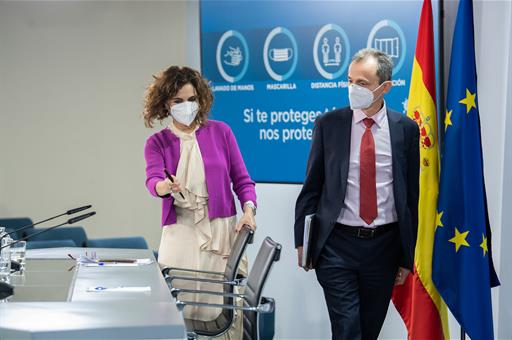Council of Ministers
Government pushes through reform of Science Act and reorganises public research bodies
Council of Ministers - 2021.3.30
Moncloa Palace, Madrid
The Council of Ministers analysed the draft bill to amend the Science, Technology and Innovation Act, to create an attractive and stable research career, boost the transfer of knowledge and improve the governance of the Spanish system on the matter.
The Minister for the Treasury and Government Spokesperson, María Jesús Montero, recalled that one of the government's great priorities, notified by the President of the Government in his investiture speech, is a commitment to research, development and innovation as a driver of economic progress and a source of social well-being. She also highlighted that the pandemic has made it clear that "science plays a central role in each policy developed by the government, which are all cross-cutting".
The Minister for Science and Innovation, Pedro Duque, stressed that the National Budget allocates unprecedented funding for research and development activities, boosted by the Recovery Funds. "We must show that we want to be a country of science, which leaves the next generation with more knowledge and more competitive", he said.
Goals of the reform of the Science Act
Attractive and stable scientific career
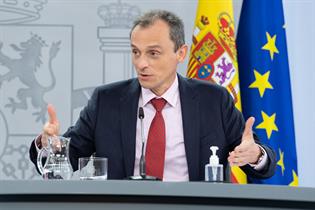 Foto: Pool Moncloa/Borja Puig de la BellacasaPedro Duque argued that the situation of scientists in Spain is anomalous compared with other cutting-edge scientific countries because there is no labour stability in Spain until after the age of 40.
Foto: Pool Moncloa/Borja Puig de la BellacasaPedro Duque argued that the situation of scientists in Spain is anomalous compared with other cutting-edge scientific countries because there is no labour stability in Spain until after the age of 40.
Accordingly, the first goal of the reform is to ensure that researchers have an attractive, predictable and stable career, which allows talent to be attracted and retained. The government proposes to create a recruitment model similar to the 'tenure track', employed in the United States, Canada and eight European countries, which consists of permanent employment contracts subject to an objective and transparent external evaluation. Under this model, indicated the minister, joining the system will guarantee equal opportunities and reward talent and real dedication.
Pedro Duque added that the government will introduce a system to attract young talent through scientific consolidation subsidies allocated to the commencement of new research projects.
Innovation based on knowledge
The minister announced that incentives for scientific personnel will be improved so that their research reaches society. The direct management of start-ups stemming from research results will be facilitated and the existing knowledge transfer offices at research centres will be geared towards the market, the productive fabric and the creation of wealth.
Pedro Duque indicated that Spain stands in 30th position in the world in terms of patent applications per inhabitant, although in reality scientific production is ranked between 12th and 20th position. "There is a long way to go to improve the transfer of knowledge".
Governance of Spanish system
The future law also seeks to improve the governance of the Spanish Science, Technology and Innovation System, with new complementary programmes between the Central Government and the regional governments to finance and carry out joint and strategic R&D+i actions.
Pedro Duque announced that regulatory reforms are also being studied to boost the creation of research centres and infrastructures between the Central Government and the regional governments, together with administrative flexibility for new research infrastructure projects.
Reorganisation of Public Research Bodies
The government has approved the integration of the Geomining Institute of Spain (Spanish acronym: IGME), the Spanish Oceanography Institute (Spanish acronym: IEO), the National Institute for Agricultural and Food Research and Technology (Spanish acronym: INIA) into the National Scientific Research Council (Spanish acronym: CSIF).
The minister argued that, through this absorption, these centres will multiply their organisational capabilities and scientific and technical administrative management. "This will thus increase their capacity for expert advice on key matters for the country".
Pedro Duque argued that, as a result of the reforms pushed through on Tuesday in the field of the sciences, Spain will have the chance to become a cutting-edge country in science and innovation, which leaves the next generation with a better future, greater efficiency in its companies and in the productive fabric.
More financing for the dependency system
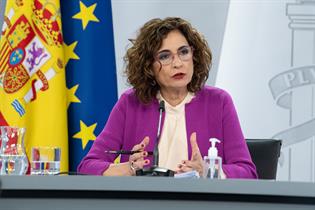 Foto: Pool Moncloa/Borja Puig de la BellacasaThe government approved the distribution among the regional governments of 283 million euros to finance the System for Autonomy and Attention to Dependency.
Foto: Pool Moncloa/Borja Puig de la BellacasaThe government approved the distribution among the regional governments of 283 million euros to finance the System for Autonomy and Attention to Dependency.
The funds correspond to the so-called 'Agreed Level' - a budgetary item eliminated in 2012 - which refers to the number of people that are incorporated into the dependency system. As well as recovering this measure, the government has also raised the amounts under the Minimum Level by 17% on average, which affects the State transfers to the regional governments for each dependent person attended to.
"This is a dual mechanism to ensure that the more people who join the system, the higher the financing for the payment of services provided in care homes for the elderly, home help and day-care units", explained María Jesús Montero.
Other goals are to reduce waiting lists and improve both the services provided and the working conditions in the sector.
In total, financing will be increased by 600 million euros this year, a 43% rise in the contribution made by the Ministry of Social Rights and 2030 Agenda.
New boost to e-government
The Council of Ministers approved the Regulation on actions and the functioning of the public sector through electronic means, which will come into force on 2 April.
María Jesús Montero argued that this new regulation will serve to improve the efficiency and transparency of the public authorities, making them more accessible and also allowing the public to undertake electronic formalities in a more secure, swifter fashion without involving unnecessary travel. To achieve this, said María Jesús Montero, it will be necessary to design more user-friendly and accessible digital services so that browsing web pages and electronic offices are intuitive.
It also seeks to improve electronic relations internally in the General State Administration, and inter-administrative relations between the central authorities and the rest of the regional and local authorities.
Regulation of biofuels
The government approved a Royal Decree to promote the use of clean energies and reduce the carbon footprint, which will regulate sales targets and the consumption of biofuels for the years 2021 and 2022.
The new legislation obliges the sale of biofuels to amount to 9.5% of all fuels consumed in Spain this year, and 10% next year. The ultimate aim, in line with the provisions of the National Integrated Energy and Climate Plan, is to reach a minimum quota of renewable energy for transport of 28% by 2030, to foster the reduction of greenhouse gases associated with this sector.
Biofuels, explained María Jesús Montero, provide a 'bridge' solution until such time as electric mobility is truly a sustainable alternative to combustion engine vehicles.
Exhumation and identification of victims in Valley of the Fallen
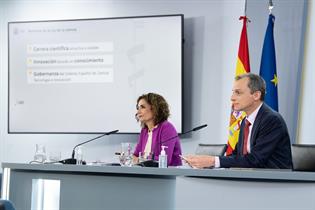 Foto: Pool Moncloa/Borja Puig de la BellacasaThe government will subsidise, with 665,000 euros, the exhumation and identification work of the remains of the victims of the Spanish Civil War and the Franco Dictatorship buried at the Abbey of Santa Cruz in the Valley of the Fallen that have been claimed by their families.
Foto: Pool Moncloa/Borja Puig de la BellacasaThe government will subsidise, with 665,000 euros, the exhumation and identification work of the remains of the victims of the Spanish Civil War and the Franco Dictatorship buried at the Abbey of Santa Cruz in the Valley of the Fallen that have been claimed by their families.
The remains of more than 33,000 victims from almost all provinces of Spain were transferred, as from 1959, to be buried in crypts in the Valley of the Fallen.
The works to gain access to these crypts, which were walled off and have remained closed since the end of the burials, will not lead to any urban modification and will focus on ensuring dignified conditions and respect for a cemetery, the repair and dignifying of graves, and the health and safety of people and the operators who access the crypts.
María Jesús Montero also recalled that the Sector Conference on Democratic Memory was constituted on Monday, which approved the distribution to the regional governments of 3 million euros to search for, identify and dignify people who went missing during the Spanish Civil War and the Dictatorship.
Constitutional challenge to Regional Health Act of Galicia
The government agreed to file a constitutional challenge to Section 5 of the Regional Act of Galicia 8/2021, which amends the regional health law, as it considers that it establishes preventive measures on public health that restrict and limit fundamental rights.
María Jesús Montero explained that the regional law provides, inter alia, for control measures on sick people that include isolation at home or internment at hospital centres, and the obligation to undergo certain preventive measures such as mandatory vaccination. Fundamental rights, she recalled, can only be regulated by a constitutional law which can thus only be approved by the State legislator.
The filing of the challenge was decided on with the backing of an opinion from the Council of State and its presentation will lead to the suspension of the section appealed against until the Constitutional Court decides, within a maximum period of five months, to ratify it or annul it.
Recognition of Musical Societies of Region of Valencia
TheMusical Societies of Region of Valencia have been declared, following an agreement by the Council of Ministers, as a Representative Manifestation of Tangible Cultural Heritage.
This movement has 550 federated Musical Societies, with more than 1,100 musical bands, 200,000 members and 60,000 students. María Jesús Montero highlighted its unique nature in the world as an "associative phenomenon in the region and a fundamental tool for intergenerational coexistence and between different layers of society".
Current affairs
COVID-19
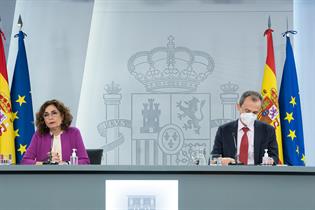 Foto: Pool Moncloa/Borja Puig de la BellacasaThe Government Spokesperson declared her concern over the spread of the pandemic with a weekly cumulative incidence rate that is on the rise, and stressed the need to step up preventive measures and address mobility and social interactions with individual responsibility, particularly over Easter. "We all want to put the restrictions behind us but we have not reached the stage where we can relax yet and we must not allow any form of neglect".
Foto: Pool Moncloa/Borja Puig de la BellacasaThe Government Spokesperson declared her concern over the spread of the pandemic with a weekly cumulative incidence rate that is on the rise, and stressed the need to step up preventive measures and address mobility and social interactions with individual responsibility, particularly over Easter. "We all want to put the restrictions behind us but we have not reached the stage where we can relax yet and we must not allow any form of neglect".
María Jesús Montero reported that more than 1 million doses of vaccines were distributed to the regional governments on Monday and trusted that a turning point will be reached in April by tripling the number of doses that are due to arrive.
Cabinet reshuffle
The minister announced that the President of the Government, Pedro Sánchez, will announce a cabinet reshuffle later on Tuesday, caused by the resignation of the Second Vice-President of the Government and Minister for Social Rights and 2030 Agenda, Pablo Iglesias, to contest the regional elections in Madrid.
María Jesús Montero stated that at the Council of Ministers meeting, the last to be attended by Pablo Iglesias, the President of the Government expressed "his recognition, affection and gratitude for his work".
In relation to this reshuffle, María Jesús Montero announced the appointments, approved at the Council of Ministers, of new senior officials, with several new State secretaries and Government Delegates in Andalusia, Galicia and Madrid.
Non official translation





